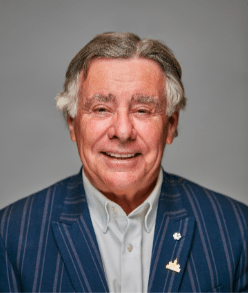Brian Felesky is a guarantor and adviser for the Immigrant Access Fund, soon to be renamed Windmill Microlending.

Brian Felesky, a guarantor and adviser for the Immigrant Access Fund, soon to be renamed Windmill Microlending.
Calgary’s Business: Can you explain what Windmill Microlending is and what it does?
Felesky: Windmill Microlending, which was until recently called Immigrant Access Fund, is a non-profit organization offering microloans of up to $10,000 to help immigrants and refugees pay for the costs of getting their professional accreditation in Canada.
It was founded by Dr. Maria Erikson in 2005 on a unique model. Individuals (like myself, Jim Gray and many others in Calgary) have provided guarantees to back the loans in the early days, and continue to do so today.
CB: Why was it created?
Felesky: Canada (like all countries in the developed world) needs highly-qualified, skilled and professional immigrants. Accordingly, Canada gives priority status to immigrants with skills and experience. However, upon their arrival, Canada provides little support to assist immigrants to get accredited here. This is a shame. It’s a big loss for immigrants and for Canada.
Too often our skilled immigrants are relegated to low-skilled jobs (such as taxi drivers, fast-food workers and cleaners) and are economically unable to take time off to pursue the credentialing process. Often, immigrants don’t even understand the particular accreditation processes applicable to them in Canada. Hence, microloans and guidance helps immigrants to bridge the gap between a survival job (for which they are over-skilled) and being able to pursue their professional career in Canada.
CB: Can you give me a sense of its magnitude over the years in terms of how many people have been helped and how much money has been loaned out?
Felesky: From giving our first microloan in Calgary in 2005, and offering seven loans in that first year, we’ve now lent over $21 million to over 3,700 immigrants and refugees all across the country. Despite these loans being considered fairly high risk, our repayment rate is a remarkable 98 per cent. On average, our clients have tripled their income by the time their loan is repaid. This success is best reflected in the grateful and emotional testimonials of immigrants, who have gone from a low-skill job (like sweeping floors) to their working in their profession (dentistry, pharmacy, engineering).
CB: What are the main challenges faced by immigrants today in getting their professional credentials?
Felesky: There are a number of barriers for immigrants, but money is a big one. Access to credit is also an issue, as many newcomers don’t have a Canadian credit history or collateral, despite the fact they may have been very successful professionals in their home country.
CB: Why is the integration of immigrants and refugees integral to Canada’s economic prosperity?
Felesky: Without immigration, Canada’s population is declining. Accordingly, we need skilled immigrants very much. We need to massively increase lending and guidance for skilled immigrants as we are only scratching the surface in terms of their need. Existing government support (provincially and federally) is greatly appreciated, but it must be increased.
Our country loses $12.7 billion a year due to under-employment of our skilled immigrants. Further, when immigrants aren’t able to integrate themselves into the economy, in their profession or skill set, their settlement experience suffers, as does their sense of belonging. Word gets around to other immigration candidates around the world. They look to other countries which do a better job integrating immigrants, and Canada misses out.
On the other hand, when skilled immigrants are able to work in their profession, they make much higher income. It improves their sense of belonging and self-worth. They contribute and pay taxes at a greater level.
Canada must up its game on a very large scale, and greatly increase the guidance and loans to facilitate accreditation. It’s for our benefit and the benefit of our immigrants. Failure to do so means a gargantuan waste of potential for Canada, which many other countries are very happy to take up and realize.
– Mario Toneguzzi
![]() The views, opinions and positions expressed by columnists and contributors are the author’s alone. They do not inherently or expressly reflect the views, opinions and/or positions of our publication.
The views, opinions and positions expressed by columnists and contributors are the author’s alone. They do not inherently or expressly reflect the views, opinions and/or positions of our publication.


